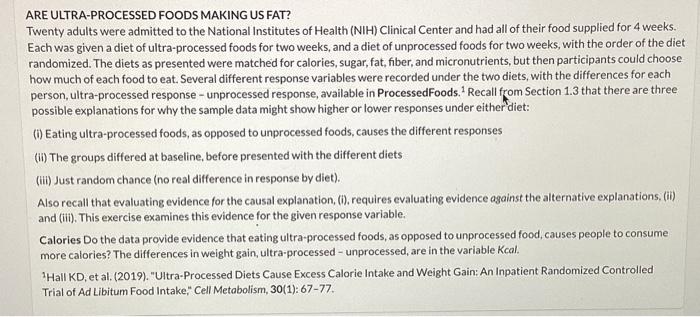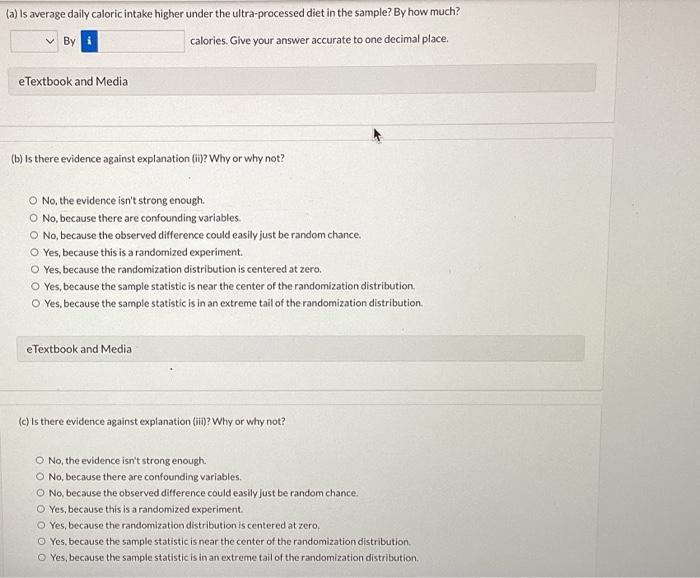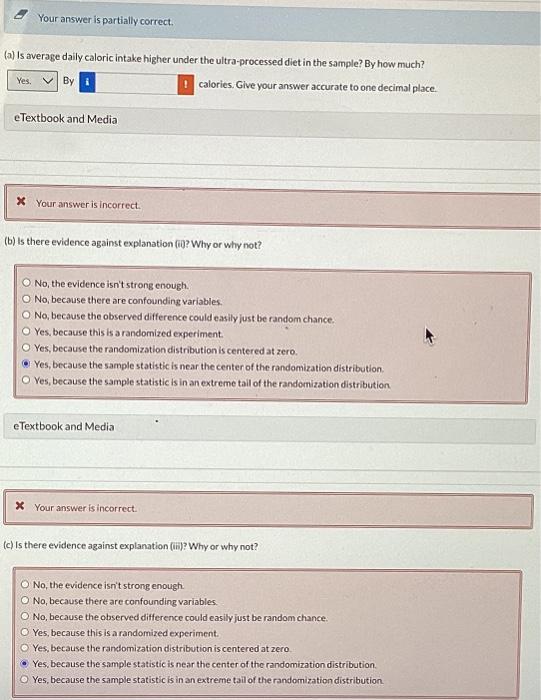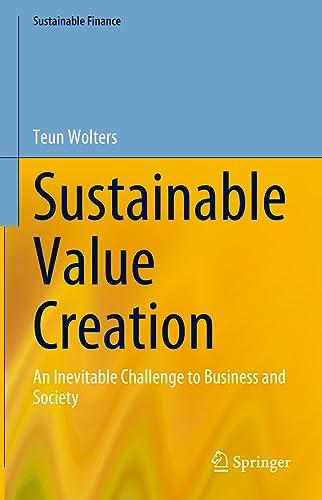answer question with information provided
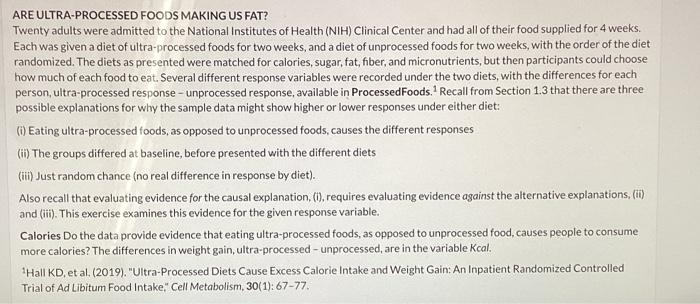
ARE ULTRA-PROCESSED FOODS MAKING US FAT? Twenty adults were admitted to the National Institutes of Health (NIH) Clinical Center and had all of their food supplied for 4 weeks. Each was given a diet of ultra-processed foods for two weeks, and a diet of unprocessed foods for two weeks, with the order of the diet randomized. The diets as presented were matched for calories, sugar, fat, fiber, and micronutrients, but then participants could choose how much of each food to eat. Several different response variables were recorded under the two diets, with the differences for each person, ultra-processed response - unprocessed response, available in ProcessedFoods. 1 Recall from Section 1.3 that there are three possible explanations for why the sample data might show higher or lower responses under either diet: (i) Eating ultra-processed foods, as opposed to unprocessed foods, causes the different responses (ii) The groups differed at baseline, before presented with the different diets (iii) Just random chance (no real difference in response by diet). Also recall that evaluating evidence for the causal explanation, (i), requires evaluating evidence against the alternative explanations, (ii) and (iii). This exercise examines this evidence for the given response variable. Calories Do the data provide evidence that eating ultra-processed foods, as opposed to unprocessed food, causes people to consume more calories? The differences in weight gain, ultra-processed - unprocessed, are in the variable Kcal. 2 Hall KD, et al. (2019). "Ultra-Processed Diets Cause Excess Calorie Intake and Weight Gain: An Inpatient Randomized Controlled Trial of Ad Libitum Food Intake," Cell Metabolism, 30(1): 67-77. (a) Is average daily caloric intake higher under the ultra-processed diet in the sample? By how much? By calories. Give your answer accurate to one decimal place. eTextbook and Media (b) Is there evidence against explanation (ii)? Why or why not? No, the evidence isn't strong enough. No, because there are confounding variables. No, because the observed difference could easily just be random chance. Yes, because this is a randomized experiment. Yes, because the randomization distribution is centered at zero. Yes, because the sample statistic is near the center of the randomization distribution. Yes, because the sample statistic is in an extreme tail of the randomization distribution. eTextbook and Media (c) Is there evidence against explanation (iii)? Why or why not? No, the evidence isn't strong enough. No, because there are confounding variables. No, because the observed difference could easily just be random chance. Yes, because this is a randomized experiment. Yes, because the randomization distribution is centered at zero. Yes, because the sample statistic is near the center of the randomization distribution. Yes, because the sample statistic is in an extreme tail of the randomization distribution. ARE ULTRA-PROCESSED FOODS MAKING US FAT? Twenty adults were admitted to the National Institutes of Health (NIH) Clinical Center and had all of their food supplied for 4 weeks. Each was given a diet of ultra-processed foods for two weeks, and a diet of unprocessed foods for two weeks, with the order of the diet randomized. The diets as presented were matched for calories, sugar, fat, fiber, and micronutrients, but then participants could choose how much of each food to eat. Several different response variables were recorded under the two diets, with the differences for each person, ultra-processed response - unprocessed response, available in ProcessedFoods. 1 Recall from Section 1.3 that there are three possible explanations for why the sample data might show higher or lower responses under either diet: (i) Eating ultra-processed foods, as opposed to unprocessed foods, causes the different responses (ii) The groups differed at baseline, before presented with the different diets (iii) Just random chance (no real difference in response by diet). Also recall that evaluating evidence for the causal explanation, (i). requires evaluating evidence against the alternative explanations, (ii) and (iii). This exercise examines this evidence for the given response variable. Calories Do the data provide evidence that eating ultra-processed foods, as opposed to unprocessed food, causes people to consume more calories? The differences in weight gain, ultra-processed - unprocessed, are in the variable Kcal. 1 Hall KD, et al. (2019). "Ultra-Processed Diets Cause Excess Calorie Intake and Weight Gain: An Inpatient Randomized Controlled Trial of Ad Libitum Food Intake," Cell Metabolism, 30(1):6777. (a) Is average daily caloric intake higher under the ultra-processed diet in the sample? By how much? By calories, Give your answer accurate to one decimal place. eTextbook and Media 26 Your answer is incorrect (b) Is there evidence against explanation (i0? Why or why not? No, the evidence isn't strong enough. No, because there are confounding variables. No, because the observed difference could easily just be fandom chance. Yes, because this is a randomized experiment. Yes, because the randomization distribution is centered at zero. Yes, because the sample statistic is near the center of the randomiration distribution. Yes, because the sample statistic is in an extreme tail of the randomization distribution eTextbook and Media * Your answer is incorrect. (c) Is there evidence against explanation (iii)? Why or why not? No, the evidence isn't strong enough. No, because there are confounding variables. No, because the observed difference could easily just be random chance. Yes, because this is a randomized experiment. Yes, because the randomization distribution is centered at zero Yes, because the sample statistic is near the center of the randomization distribution. Yes, because the sample statistic is in an extreme tail of the randomization distribution. ARE ULTRA-PROCESSED FOODS MAKING US FAT? Twenty adults were admitted to the National Institutes of Health (NIH) Clinical Center and had all of their food supplied for 4 weeks. Each was given a diet of ultra-processed foods for two weeks, and a diet of unprocessed foods for two weeks, with the order of the diet randomized. The diets as presented were matched for calories, sugar, fat, fiber, and micronutrients, but then participants could choose how much of each food to eat. Several different response variables were recorded under the two diets, with the differences for each person, ultra-processed response - unprocessed response, available in ProcessedFoods. 1 Recall from Section 1.3 that there are three possible explanations for why the sample data might show higher or lower responses under either diet: (i) Eating ultra-processed foods, as opposed to unprocessed foods, causes the different responses (ii) The groups differed at baseline, before presented with the different diets (iii) Just random chance (no real difference in response by diet). Also recall that evaluating evidence for the causal explanation, (i), requires evaluating evidence against the alternative explanations, (ii) and (iii). This exercise examines this evidence for the given response variable. Calories Do the data provide evidence that eating ultra-processed foods, as opposed to unprocessed food, causes people to consume more calories? The differences in weight gain, ultra-processed - unprocessed, are in the variable Kcal. 2 Hall KD, et al. (2019). "Ultra-Processed Diets Cause Excess Calorie Intake and Weight Gain: An Inpatient Randomized Controlled Trial of Ad Libitum Food Intake," Cell Metabolism, 30(1): 67-77. (a) Is average daily caloric intake higher under the ultra-processed diet in the sample? By how much? By calories. Give your answer accurate to one decimal place. eTextbook and Media (b) Is there evidence against explanation (ii)? Why or why not? No, the evidence isn't strong enough. No, because there are confounding variables. No, because the observed difference could easily just be random chance. Yes, because this is a randomized experiment. Yes, because the randomization distribution is centered at zero. Yes, because the sample statistic is near the center of the randomization distribution. Yes, because the sample statistic is in an extreme tail of the randomization distribution. eTextbook and Media (c) Is there evidence against explanation (iii)? Why or why not? No, the evidence isn't strong enough. No, because there are confounding variables. No, because the observed difference could easily just be random chance. Yes, because this is a randomized experiment. Yes, because the randomization distribution is centered at zero. Yes, because the sample statistic is near the center of the randomization distribution. Yes, because the sample statistic is in an extreme tail of the randomization distribution. ARE ULTRA-PROCESSED FOODS MAKING US FAT? Twenty adults were admitted to the National Institutes of Health (NIH) Clinical Center and had all of their food supplied for 4 weeks. Each was given a diet of ultra-processed foods for two weeks, and a diet of unprocessed foods for two weeks, with the order of the diet randomized. The diets as presented were matched for calories, sugar, fat, fiber, and micronutrients, but then participants could choose how much of each food to eat. Several different response variables were recorded under the two diets, with the differences for each person, ultra-processed response - unprocessed response, available in ProcessedFoods. 1 Recall from Section 1.3 that there are three possible explanations for why the sample data might show higher or lower responses under either diet: (i) Eating ultra-processed foods, as opposed to unprocessed foods, causes the different responses (ii) The groups differed at baseline, before presented with the different diets (iii) Just random chance (no real difference in response by diet). Also recall that evaluating evidence for the causal explanation, (i). requires evaluating evidence against the alternative explanations, (ii) and (iii). This exercise examines this evidence for the given response variable. Calories Do the data provide evidence that eating ultra-processed foods, as opposed to unprocessed food, causes people to consume more calories? The differences in weight gain, ultra-processed - unprocessed, are in the variable Kcal. 1 Hall KD, et al. (2019). "Ultra-Processed Diets Cause Excess Calorie Intake and Weight Gain: An Inpatient Randomized Controlled Trial of Ad Libitum Food Intake," Cell Metabolism, 30(1):6777. (a) Is average daily caloric intake higher under the ultra-processed diet in the sample? By how much? By calories, Give your answer accurate to one decimal place. eTextbook and Media 26 Your answer is incorrect (b) Is there evidence against explanation (i0? Why or why not? No, the evidence isn't strong enough. No, because there are confounding variables. No, because the observed difference could easily just be fandom chance. Yes, because this is a randomized experiment. Yes, because the randomization distribution is centered at zero. Yes, because the sample statistic is near the center of the randomiration distribution. Yes, because the sample statistic is in an extreme tail of the randomization distribution eTextbook and Media * Your answer is incorrect. (c) Is there evidence against explanation (iii)? Why or why not? No, the evidence isn't strong enough. No, because there are confounding variables. No, because the observed difference could easily just be random chance. Yes, because this is a randomized experiment. Yes, because the randomization distribution is centered at zero Yes, because the sample statistic is near the center of the randomization distribution. Yes, because the sample statistic is in an extreme tail of the randomization distribution
